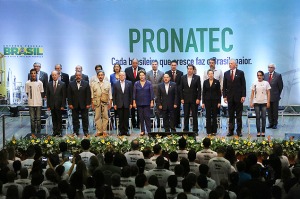Article (re)defined by FG.
Summary:
The article titled “Pronatec, previously considered a key project by Dilma, is now being deemed as ‘indifferent’ by the government” was written by Flávia Foreque and published in Folha de S.Paulo on September 24th, 2015. It informs us about a survey analysis carried out by the Brazilian government, through its Ministry of Finance (Department of Treasury), in which it shows that taking a course from the Pronatec program does not contribute to getting better employment.
Comments:
The link between better education, better jobs, and increasing economic growth is rarely discussed. It is so ingrained in Western culture that it has turned into a widespread dogma. Moreover, its naturalization is such that whenever stories that contradict this fact are heard, the government is usually blamed for not providing the correct educational opportunities.
In an article that appeared in Folha de S.Paulo, which is one of the newspapers with largest circulation in São Paulo (the most populous state in Brazil) and is highly critical of the current government, the main idea is to build on this dogma to attack a specific technical education program, which was the flagship proposal in Brazil’s president Dilma Rousseff‘s presidential campaign, by showing that it did not increase job opportunities. The program, called Pronatec, facilitates access to technical education by offering free courses in related areas under the idea that this will provide formal jobs.
The article opens up with a one-sentence paragraph containing a striking assertion “Taking a Pronatec course does not help when going back to a registered job”. It follows by reminding the reader that this was a flagship program in Rousseff’s campaign and that it is being ineffective. It is only by the third paragraph that the survey is described. It consists of a comparative analysis between two groups of people that lost their jobs: those who took a Pronatec course, and those who just registered but did not attend class. The survey shows that the first ones were not more effective in finding a new job than the latter ones. This pretends to show that the skills and knowledge learned in Pronatec do not lead to better job opportunities.
Interestingly enough, the first quotation of the article is by Secretary of Economic Policies, and reads “The result shows that taking courses does not increase the opportunities of getting registered jobs.” Thus, the whole idea behind the article is showing that this program teaches useless skills and knowledge, otherwise it would lead to better job opportunities. To further support this claim, the article quotes a campaign speech by Dilma in which she stated that Pronatec “contributes to an increase in Brazilian’s economic competitiveness” and also shows contradiction by mentioning that there were budget cuts for the project in 2015. To close the article, and in order to further evidence the internal contradictions in the government, the Ministry of Social Work is cited as claiming that Pronatec was actually effective in the northern states.
This same piece of news, as provided by a news portal for a consortium of companies that do Research and Development, makes no mention whatsoever to Rousseff’s campaign, and presents both views (Ministry of Finance and Ministry of Social Work) as independent surveys carried out with different methodologies that are further explained.
To sum up, this article uses the widespread belief that better education provides better jobs and promotes economic growth, to criticize the current Brazilian government by highlighting the inefficiency of one technical education program because it does not provide better jobs opportunities as well as showing contradictions among the government so as to support ideas of instability.
Source: “Antes vitrine de Dilma, Pronatec agora vira curso ‘indiferente’ para o governo“ (Pronatec, previously considered a key project by Dilma, is now being deemed as ‘indifferent’ by the government) by Flávia Foreque, Folha de S.Paulo, Sept. 24, 2015.

Pingback: From Agriculture to Industry… Back to Agriculture | (Re)defining Education: Power, Policy and Practice in Post-Colonial Societies
Pingback: The market push for math teachers… | (Re)defining Education: Power, Policy and Practice in Post-Colonial Societies
Human Capitalist believe that the education is the best way to improve quality of people, to boost a nation’s economy. I agree with this opinion actually, education has huge positive effect on economic development. However, with the growing rate of unemployment, a lot of people doubt if education is useful for individual development since there is no difference finding job among uneducated people and “well-educated” people. Sometimes education can be very research-oriented, ideal and impractical so that students cannot obtain practical skills for finding a job. But I don’t think we can blame education itself, unemployment can be attributed to governmental policy and economy recession as well. In addition, I always confused about one question: Is finding a job the major goal of education?
LikeLike